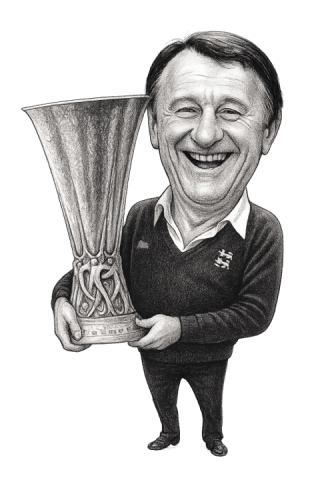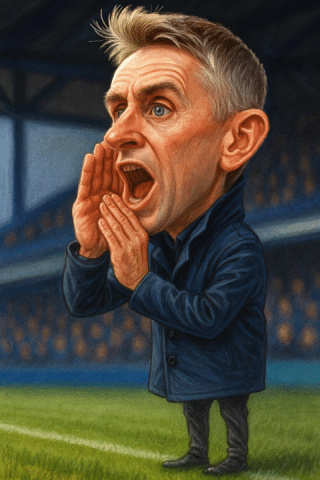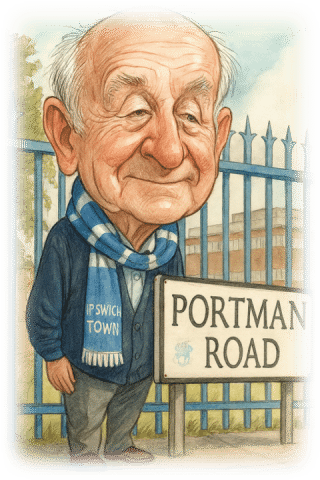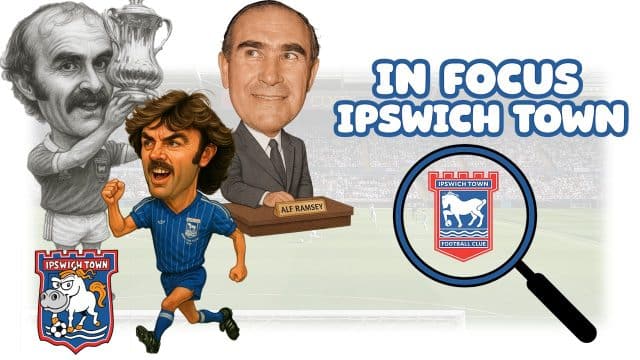Two road trips in five days, and just one point to show for it. The draw at Charlton was a gritty, if unspectacular, affair. The defeat at Preston reopened familiar frustrations: a lack of clear chances, a soft centre under pressure, and a team still searching for rhythm. It’s not a collapse. But it’s certainly a stall.
Now, with the final international break of the year looming, Swansea return to the Swansea.com Stadium needing more than just a performance. They need a result. Ipswich Town arrive in form and full of belief. While nobody’s calling this a must-win in the cold arithmetic of the table, the emotional stakes are rising. One point from nine would leave fans dissecting the direction of travel over a long, quiet fortnight.
Momentum is fragile. In a season still waiting to catch fire, this feels like a moment that matters.
🔹 Who Are Ipswich Town?
Ipswich Town Football Club was founded in 1878 and has played its home games at Portman Road since 1884. Nestled in the heart of Suffolk, Ipswich has long been one of English football’s proud provincial clubs, a side that has punched above its weight and left a lasting mark on the domestic and European stage.
lasting mark on the domestic and European stage.
The club turned professional in 1936 and joined the Football League two years later. Their rise to prominence began under Alf Ramsey, who led them to the First Division title in 1961–62. It was an extraordinary achievement for a newly promoted side. Ramsey’s success at Ipswich earned him the England job, where he famously won the World Cup in 1966.
Two decades later, under Bobby Robson, Ipswich enjoyed another golden era. They lifted the FA Cup in 1978 and went on to win the UEFA Cup in 1981, defeating AZ Alkmaar in the final. That team, featuring the likes of John Wark, Frans Thijssen and Arnold Mühren, played with flair and discipline and earned admiration across Europe.
The club’s identity has always been rooted in community, resilience and a belief in doing things the right way. From the Cobbold family’s stewardship to the East Anglian Derby rivalry with Norwich City, Ipswich Town has built a legacy that stretches far beyond its modest size. It is a club with history, heart and a story worth telling.
🔹 Life Since Relegation
Relegation from the Premier League is rarely gentle, and Ipswich Town’s return to the Championship has come with its share of questions. Alongside Leicester City and Southampton, they dropped back down after just one season in the top flight. For Ipswich, it was a campaign that exposed the gulf in quality and depth, but also offered financial stability and a chance to reset.
Many doubted whether they would bounce back quickly. Their promotion to the Premier League had felt like the culmination of an  exceptional run rather than the start of a new era. But Ipswich have responded with resilience. They currently sit 10th in the Championship table, the strongest of the three relegated sides, and remain within reach of the playoff places.
exceptional run rather than the start of a new era. But Ipswich have responded with resilience. They currently sit 10th in the Championship table, the strongest of the three relegated sides, and remain within reach of the playoff places.
Seven points from the last nine have helped steady the ship and build belief. The squad has evolved, the manager has adapted, and the mood around Portman Road is cautiously optimistic. Ipswich may not be favourites, but they are well positioned to push on.
🔹 FA Cup and European Glory
For a club from a modest Suffolk town, Ipswich Town’s golden era remains one of the most romantic stories in English football. Under the stewardship of Bobby Robson, the late 1970s and early 1980s saw Ipswich rise to the very top of the domestic and European game.
The first major breakthrough came in 1978 when Ipswich lifted the FA Cup, defeating Arsenal 1–0 at Wembley thanks to a goal from Roger Osborne. It was a performance full of discipline and belief, and it marked the beginning of something special.
Three years later, Ipswich conquered Europe. Their UEFA Cup run in 1980–81 was a masterclass in tactical control and attacking flair. They beat the likes of Saint-Étienne and Cologne before overcoming AZ Alkmaar in a thrilling two-legged final. John Wark, who scored 14 goals in that European campaign, became a cult hero. The Dutch duo of Arnold Mühren and Frans Thijssen brought continental class to Portman Road.
That same season, Ipswich finished runners-up in the First Division, narrowly missing out on the title to Aston Villa. But their football won admirers across the continent. For a time, Ipswich were not just competing with the best. They were beating them.
It remains a source of immense pride for the club and its supporters. A reminder that with the right manager, the right players and the right spirit, even the smallest clubs can dream big.
🔹 Meet the Referee
 Saturday’s game will be officiated by Edward Duckworth, a relatively new face in the EFL Championship. Born in Preston, Duckworth began his refereeing career in the Lancashire Sunday League before progressing through the ranks. He was added to the National League list for the 2022–23 season and later promoted to the EFL, where he now officiates in League One and League Two.
Saturday’s game will be officiated by Edward Duckworth, a relatively new face in the EFL Championship. Born in Preston, Duckworth began his refereeing career in the Lancashire Sunday League before progressing through the ranks. He was added to the National League list for the 2022–23 season and later promoted to the EFL, where he now officiates in League One and League Two.
Duckworth made his Championship debut on 4 October 2025, overseeing Bristol City’s clash with Queens Park Rangers at Ashton Gate. This weekend marks his first time in charge of a Swansea City fixture, with no prior record of officiating the Swans either home or away.
He will be assisted by David Harrison and Nigel Lugg, with Robert Madley acting as fourth official. Duckworth’s background as the FA’s National Talent Manager for match officials adds an interesting layer to his profile. He is a referee with a developmental eye and a fast-rising career.
🔹 Coming in from the East
Malcolm has followed Ipswich Town for over fifty years. He remembers the glory days as if they were yesterday. The FA Cup win in 1978, the UEFA Cup triumph in 1981, and the calm authority of Bobby Robson in the dugout. Those memories still shape how he sees the club today.
Last season’s Premier League campaign was, in his words, good for the bank balance but hard to watch. The defeats piled up, the confidence drained, and the gulf in class was clear. But Malcolm never stopped watching. He saw the effort, the flashes of promise and the quiet resilience that has carried into this season.
He’s not making the trip to Swansea but he’ll be watching closely. We’ve hit a good patch, he says. Seven from the last nine and we’re playing with a bit more belief. One more win before the break and it’s been a very good first third of the season. He’s full of praise for Kieran McKenna, calling him the best manager the club has had since Robson. He gets us, Malcolm says. He’s got a plan and the players believe in it
🔹 Meet the Manager
Kieran McKenna was appointed Ipswich Town manager in December 2021, taking over from Paul Cook and quickly establishing himself as one of the most respected young coaches in the EFL. Born in London but raised in County Fermanagh, McKenna’s playing career was cut short by a hip injury at the age of 22, having come through the youth ranks at Tottenham Hotspur and represented Northern Ireland at under-19 and under-21 level.
After retiring, McKenna studied sports science at Loughborough University and began coaching at Tottenham, later joining Manchester United where he worked with the under-18s before becoming part of the first-team staff under José Mourinho, Ole Gunnar Solskjær and Ralf Rangnick.
His impact at Ipswich has been transformative. In his first full season, he guided the club to promotion from League One, winning 13 of their final 15 games. The following year, he led them to a second successive promotion, returning Ipswich to the Premier League for the first time in 22 years. His preferred formation is a 4-2-3-1, often deploying a second striker in the number 10 role to maximise attacking transitions.
McKenna is known for his tactical clarity, calm leadership and ability to develop players. Despite recent links to high-profile vacancies, including Celtic, he has reiterated his commitment to Ipswich, describing it as a special club and a long-term project.
🔹 The Prediction
Trying to predict Swansea City is a fool’s errand. The last two games have shown signs of improvement in shape and intent, but the lack of clear-cut chances remains a concern. We move the ball well in phases, but too often the final pass is missing or the shot is rushed.
Ipswich arrive in form, confident and with a clear identity. Swansea, by contrast, are still searching for theirs. That does not mean they cannot win. It just means it is hard to know what version of the team will turn up.
If the Swans can find a spark early, get the crowd behind them and stay compact out of possession, there is a path to three points. But if the rhythm stutters and Ipswich settle quickly, it could be a long afternoon.
Score prediction? Head says 1–2 Ipswich. Heart says 2–1 Swansea. The truth probably lies somewhere in between. A draw feels most likely — 1–1, with both sides leaving with something but neither fully satisfied.
🔹 Closing Thoughts
Nobody would call this last chance saloon for Alan Sheehan, but he will not want to head into a two-week break on the back of one point from nine. That kind of return invites questions, analysis and noise, and it gives supporters too much time to dwell.
This is a challenge, no doubt. Ipswich are flying, full of confidence and belief. But Swansea are back at home on a Saturday afternoon, with a chance to reset the tone of the season. A win would not just lift the table. It would lift the mood.
WHO ARE WE?

This article first appeared on JACKARMY.net.

